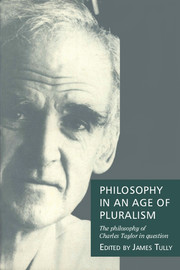Book contents
- Frontmatter
- Contents
- Notes on the contributors
- Preface
- Acknowledgements
- Introduction
- Part I Foundations
- Part II Interpreting modernity
- Part III Natural and human sciences
- 6 The strange estrangement: Taylor and the natural sciences
- 7 Is there an objective spirit?
- Part IV Philosophy in practice
- Part V Ethics, politics and pluralism
- Part VI Reply and re-articulation
- Bibliography of the works of Charles Taylor
- Index
6 - The strange estrangement: Taylor and the natural sciences
Published online by Cambridge University Press: 05 June 2012
- Frontmatter
- Contents
- Notes on the contributors
- Preface
- Acknowledgements
- Introduction
- Part I Foundations
- Part II Interpreting modernity
- Part III Natural and human sciences
- 6 The strange estrangement: Taylor and the natural sciences
- 7 Is there an objective spirit?
- Part IV Philosophy in practice
- Part V Ethics, politics and pluralism
- Part VI Reply and re-articulation
- Bibliography of the works of Charles Taylor
- Index
Summary
In the opening paragraphs of the introduction of his Philosophical papers Charles Taylor confesses himself to be in the grip of an obsession. He is, he says, a hedgehog, a monomaniac endlessly polemicising against a single idea – ‘the ambition to model the study of man on the natural sciences’. He calls this idea many things, most often ‘naturalism’ or ‘the naturalistic world view’, and he sees it virtually everywhere in the human sciences. The invasion of those sciences by alien and inappropriate modes of thought has conduced toward the destruction of their distinctiveness, their autonomy, their effectiveness and their relevance. Driven on by the enormous (and ‘understandable’) prestige of the natural sciences in our culture we have continually been led into a false conception of what it is to explain human behaviour.
The purpose of this polemic, aside from the desire to rid the human sciences of some ‘terribly implausible’, ‘sterile’, ‘blind’, ‘half-baked’ and ‘disastrous’, enterprises – Skinnerian behaviourism, computer-engine psychology, truth-conditional semantics, and primacy-of-right political theory – is to clear a space in those sciences for ‘hermeneutic’ or ‘interpretivist’ approaches to explanation. Interpretation, the ‘attempt to make sense of an object of study’ in some way ‘confused, incomplete, cloudy’ … contradictory … unclear’, is an irremovable part of any would-be science of human affairs. And it is precisely that which ‘the natural science model’, with its passion for Wertfreiheit, predictability and brute facts – defensible enough in its proper domain – effectively blocks.
- Type
- Chapter
- Information
- Philosophy in an Age of PluralismThe Philosophy of Charles Taylor in Question, pp. 83 - 95Publisher: Cambridge University PressPrint publication year: 1994
- 6
- Cited by



